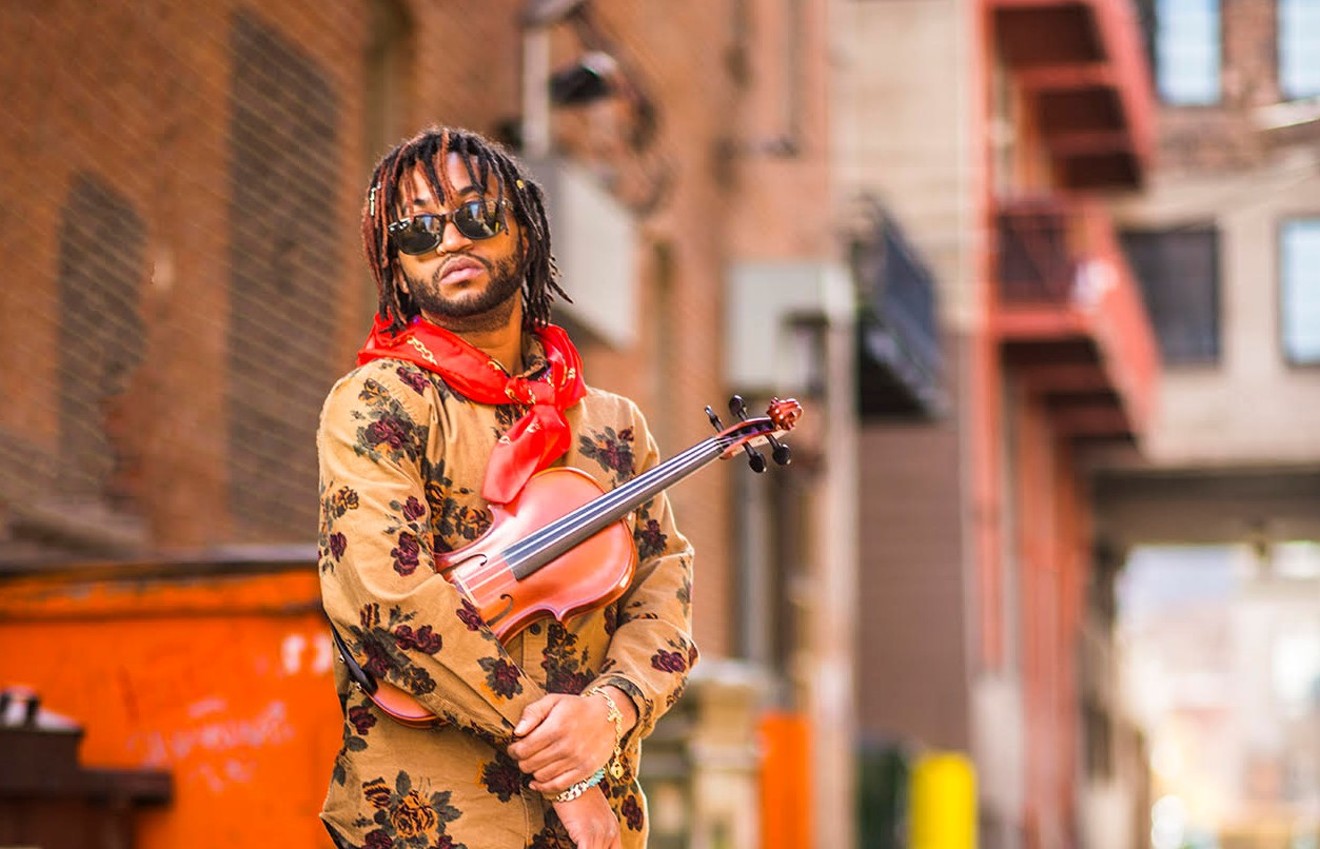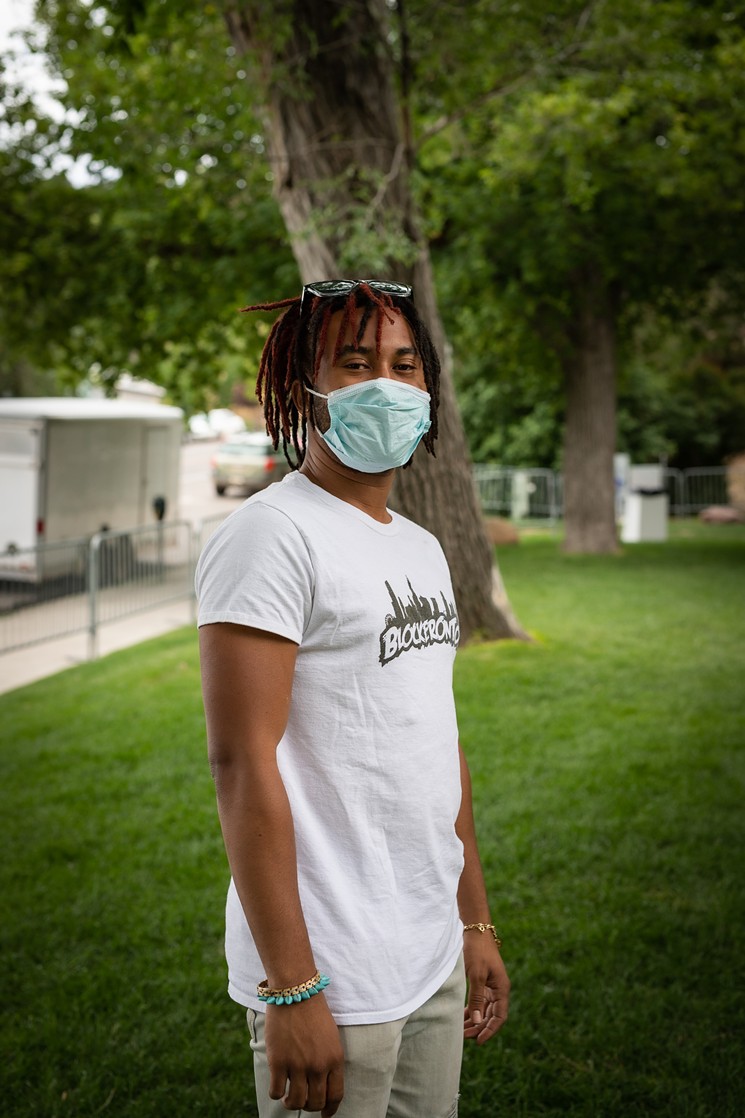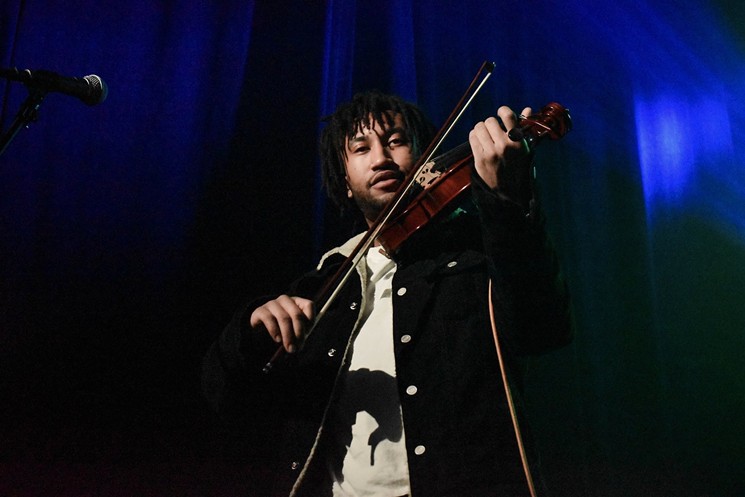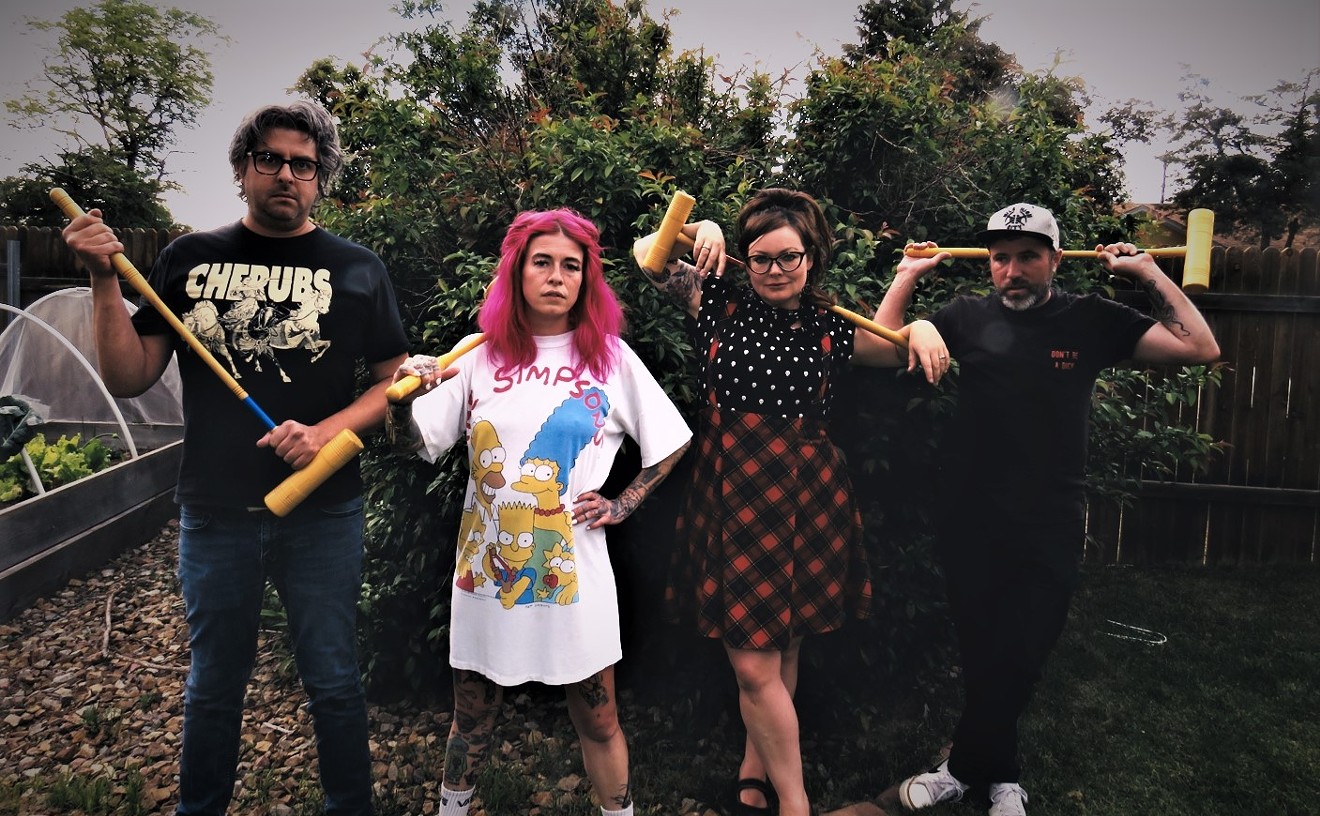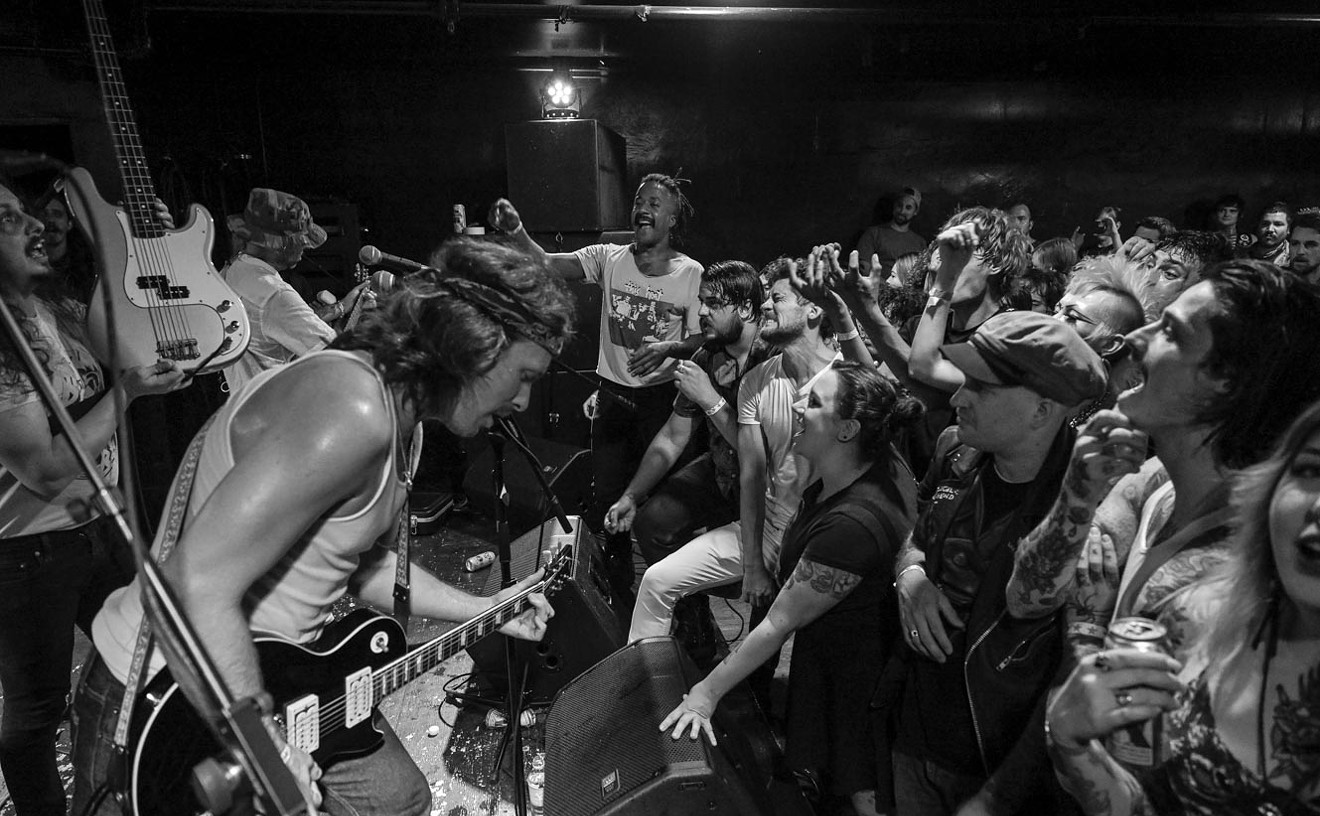On June 27, Alex Blocker joined around a hundred fellow string musicians outside the Aurora Municipal Center; they wanted to commemorate Elijah McClain, the 23-year-old Black violinist and massage therapist who'd died after a violent encounter with Aurora police in August 2019. The musicians performed together as riot cops, chasing down other protesters, disrupted their music and sprayed tear gas. Still, Blocker remembers the night as sweet yet powerful.
“I went out there with some friends of mine, and we had a great time,” says Blocker, who is as joyful about life as he is serious about eradicating police violence. “There were some very talented musicians out there.”
Blocker has been involved in the Black Lives Matter movement since the 2014 murder of Eric Garner, who uttered the words "I can't breathe" after a New York cop put him in a chokehold and strangled him. But McClain’s death really resonated: Both were Black, both in their twenties, both played the violin.
In the weeks before the Aurora vigil, Blocker had been protesting and making music to support the uprising over racist law enforcement actions around the country. “In the resurgence of rights movements around the world, I felt it was my duty to get active on that," he explains.
So he spoke at a Juneteenth rally in Buckley Park in Durango. There he described the issues that young Black people face and connected them to the struggles of communities in the Southwest, including ICE deportations and the ongoing injustices experienced by Indigenous people. He played an old-timey ballad called "Elijah McClain" with Let Them Roar, a Carbondale folk band, using the song as a way to promote the movement. And he released another song, “Open Eulogy 2,” a hip-hop track raging against police murdering Black men, women and transgender people. The track followed up on his original “Open Eulogy,” which Blocker wrote while demonstrating against killer cops several years ago.
This summer, Blocker was far from the only Denver musician taking action. Chy Reco, A Meazy, Wil Guice, Ramond and Mic Coats released “I Can’t Breathe (Again),” a powerful anthem against the murder of George Floyd by Minneapolis police. Brothers of Brass, the Pink Hawks, Nathaniel Rateliff and the Lumineers all hit the streets demanding police reform or the abolition of police forces altogether. Artists painted portraits and murals of victims of law enforcement. And on October 8, artist Lares Feliciano’s video protesting police brutality, which was scored by Wheelchair Sports Camp, showed in a continuous loop for over an hour on the outside of the Clyfford Still Museum.
Now, months after the June protests broke out after Floyd's death, Blocker is looking back at how both the movement and the musicians supporting it have evolved.
“I think a few months later, you really get to see who this is important to and who that was a trend for,” he says, noting that he's been pleasantly surprised by what he's found. “Overall, I’m pretty proud. This hasn’t really disappeared. I think we live in a society where so many things come and go so quickly. You mention somebody passing away, and that seems like twenty years ago. I think this has stuck longer than anyone expected.”
No doubt there is an ongoing reckoning with white supremacy and power in the United States, and it’s disrupting more than just policing. The movement is changing everything from the government to podcasting to music.
“Black people have contributed so much to music,” Blocker says. “It’s just really shocking how little it seems like they are given [power] or what positions it seems like they are privy to in an industry dependent on them.” In the industry, he points out, white people dominate executive roles and serve as the industry’s gatekeepers; they determine the framework used to discuss music, and often attempt to pigeonhole Black artists into select genres.
“I notice that when Black people make songs that become hits or become mainstream or become crossover, the industry wants to put that into the category of hip-hop or R&B,” he explains. “They’re very touchy about calling that a pop song or a rock song. ... If you’re black, you’re mostly ‘urban.'
“Let’s take André 3000," he says, with a nod to the Outkast musician. "If you asked a lot of people, they’d say he was a rapper. But goodness gracious, that really undersells a lot of what he does.” He also plays the flute, produces and does much more.
Like André 3000, Blocker is a polymath. He enjoys jazz improvisation and incorporates Appalachian and classical riffs into songs. He raps, sings and produces beats to sell to other artists.
“I’m kind of in the singer-songwriter community, because everybody likes the violin,” he says. “I can do some harmonies. I’m interested in being in all the communities. I want my name to ring bells in every field.”
His fascination with different styles comes from the regions where he’s lived.
Blocker grew up in Chicago and started taking private violin lessons when he was around five. Though his parents were not musicians, they took him to concerts and ensured that he had a robust cultural education in a variety of musical genres, but especially jazz. In high school, he joined the orchestra, where he performed classical music. Then he went to Fort Lewis College in Durango, where he also played in the orchestra.
“I haven’t played classical since I was in college,” he says. “I wasn’t a great student in college, so I’m still scarred by orchestra.” In Durango, he also learned about folk music, bluegrass and singer-songwriter fare — which he doesn't exactly blast on road trips, but loves to see performed live.
After graduating, he took a job as a music teacher in the Durango public schools. But when pandemic-related funding cuts hit, he was forced to look for other work, and decided to move to Denver. “I’m from the city and wanted to get back to the city,” he explains. “I didn’t want to leave Colorado yet.”
He took a K-8 position in a public school in northeast Denver. “Education-wise, I’m a city public school kid," he says. "I’m Black. On the teaching side, it was nice to get back into a classroom that looks like what I grew up in, that was keeping me inspired.”
In the classroom, he’s in the same precarious position as many educators: figuring out how to adapt his teaching to pandemic times. As preschool and kindergarten students return to the building, he’s back in the classroom — but barred from teaching them to sing. So he’s keeping them engaged with music through dancing, storytelling and “the loophole of humming,” which is allowed.
As a performer, he has played a handful of duet dates since the COVID-19 closures. In Denver, he’s found an affinity with the jam scene and is looking to incorporate computer-based electronic music into his live set, to create a bridge between his recorded tracks, which are largely driven by beats that he and his friends have produced, and his performances, in which he and his bandmates jam wildly.
He recently dropped the music video for his tidy pop track “Freeza’,” an artistic manifesto. In it, he pays homage to influences like Gladys Knight, Prince and Stevie Wonder. He boasts about straddling styles, showcases his violin playing, and also roots himself in the indie hip-hop tradition of Chicago, where he produced and recorded at YouMedia alongside artists like Chance the Rapper and Noname.
Blocker has built a website to promote his new music, announce shows and release what he calls “season two” of his BlockerOnTop fashion line. His clothing is meant to stand above basic tour merchandise; he wants people to embrace his designs, whether they know his music or not.
He’s also gearing up to release his first live album later this month — a project “that references some of the folk and jam-band community’s [influence] on me at this point,” he says. “Mostly with pop and R&B, you don’t really get live albums. That’s something I’ll start on this set.”
Blocker hopes that his efforts inspire others to reach for their goals, even during these tough times.
“As long as you’re coming from a place of positivity, and as long as you’re putting your whole heart and mind toward it, whatever the 'it' is is possible,” Blocker says. “It just happened that I figured that out through music and visual arts.”
And whatever people decide to do, he hopes it includes a push for social justice, recognition that Black Lives Matter, and a brighter future for all.
“So many I talk to are feeling end-of-the-world vibes right now,” he concludes. “On the environmental side, I don’t have much more to say than a ‘Yikes.’ As far as how one man is treating the next man, we’re going to do something about that. As far as making sure kids have the tools to have a better tomorrow, we’re going to do something about that.”
To see "Freeza'" and hear more, go to Alex Blocker's website at alexblocker.com.
[
{
"name": "Air - MediumRectangle - Inline Content - Mobile Display Size",
"component": "12017618",
"insertPoint": "2",
"requiredCountToDisplay": "2"
},{
"name": "Editor Picks",
"component": "17242653",
"insertPoint": "4",
"requiredCountToDisplay": "1"
},{
"name": "Inline Links",
"component": "18838239",
"insertPoint": "8th",
"startingPoint": 8,
"requiredCountToDisplay": "7",
"maxInsertions": 25
},{
"name": "Air - MediumRectangle - Combo - Inline Content",
"component": "17261320",
"insertPoint": "8th",
"startingPoint": 8,
"requiredCountToDisplay": "7",
"maxInsertions": 25
},{
"name": "Inline Links",
"component": "18838239",
"insertPoint": "8th",
"startingPoint": 12,
"requiredCountToDisplay": "11",
"maxInsertions": 25
},{
"name": "Air - Leaderboard Tower - Combo - Inline Content",
"component": "17261321",
"insertPoint": "8th",
"startingPoint": 12,
"requiredCountToDisplay": "11",
"maxInsertions": 25
}
]

